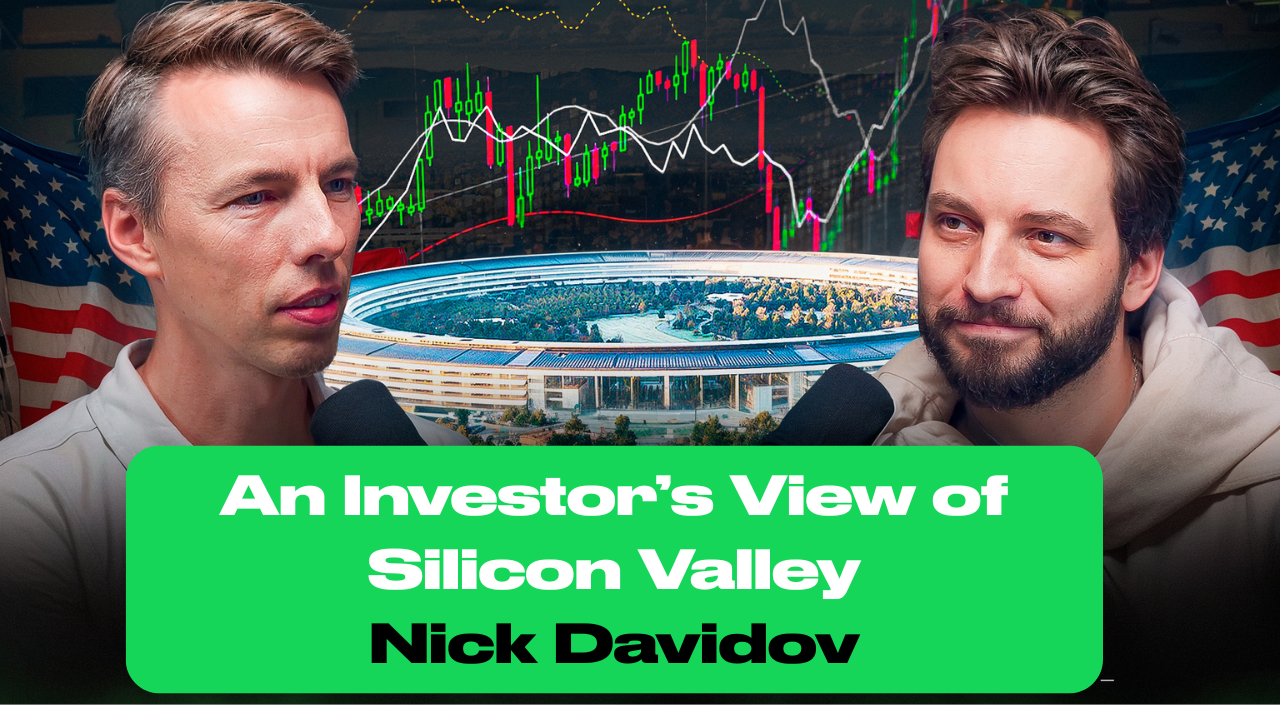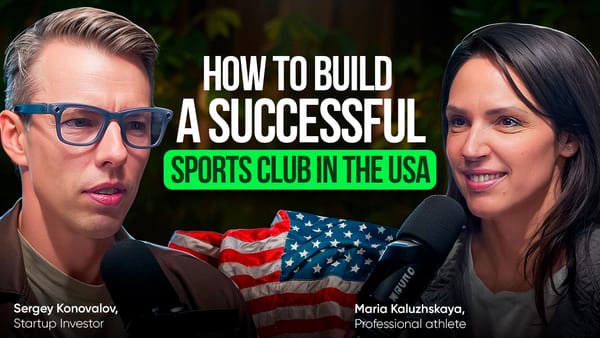Interview with Nick Davidov

In this episode, I talk with Nick Davidov, investor and founder of Davidovs VC, about the journey from early startups in Russia to investing in dozens of U.S. companies. It’s an honest conversation about risk, faith, immigration — and how new unicorns are born.

When and why did you decide to move to the U.S.?
Marina and I studied in Edinburgh and could’ve stayed in the U.K., but in 2009 the situation was very different — the crisis hit, and the idea of becoming a bank analyst didn’t excite me. I worked in system integration back then, and I was bored — I’ve always loved breaking down business processes. Things were going well in Russia: iTech Capital, SEO-pult, Aviasales, TradingView — we closed some great deals.
But the political events of 2013–2014 — Crimea, sanctions, reshuffling of the ecosystem — made it clear that the internet’s growth momentum in Russia had hit the immovable mass of the state. Marina and I did a simple foresight exercise and said: let’s run a two-year experiment in the U.S.
What broke your deal with Franklin Templeton, and how did it influence your move?
We had built a holding of several AdTech companies — a solid business: around $130 million in revenue, growing 30–40% year-over-year. Franklin Templeton valued us almost at unicorn level and started due diligence. Then Sochi Olympics ended, Crimea happened, and investors began to back out. Franklin Templeton withdrew.
Later we received an offer from Gazprombank’s fund. I came to their office in a suit, right across from the Kremlin — and the news hit: Gazprombank was under sanctions. That killed any chance of NASDAQ listing or international scaling.
It was a heavy emotional blow: three times we were inches from the finish line, and external forces erased everything. That’s when I realized — I can’t control geopolitics. It’s time to think about a different future.

How did you make the move, and what were the first months like?
It was a hard decision. We agreed it would be a two-year experiment — just try it out. At first, I helped a shareholder launch a business in Los Angeles, but soon felt I needed to be among my kind of people. Palo Alto reminded me of the old Yandex campus — that same feeling of being surrounded by your tribe.
Financially, it was a downshift. We had savings and equity, but not endless cash. After six months, the money was nearly gone. Marina’s health worsened, and it hit us emotionally. Vipassana helped her reset — and she asked me a simple question:
“What do you truly enjoy?”
That’s when I picked a project — MSQRD. I went all in. Two months later, Twitter reached out — that saved us and gave a new impulse.
Did you ever feel like going back during those first six months?
Absolutely. The doubts were strong. I didn’t want to go back and admit failure — I hate losing. The pressure was real: bills, Marina’s health, burnout. But the “ban on return” was internal — I didn’t want to give skeptics and haters the satisfaction of being right. That feeling fueled me.
How did you end up selling MSQRD and negotiating with giants like Facebook and Twitter?
Good companies sometimes attract buyers on their own — but that wasn’t our case. It was all about proper positioning and lots of work. Twitter reached out first.
With Facebook, I talked to five people — all said no. The sixth one said yes. Lesson learned: find the right bees to get the right honey. Negotiations were tough — they had very experienced dealmakers on their side. But that’s part of the game.
Were there painful failures along the way?
Yes. Cherry was a big lesson. Earlier, I saw everything through a binary lens — either external forces (like politics) or my own mistakes. But Cherry taught me the third option: pivoting. Sometimes you don’t need to climb over the mountain — you can go around it.
Being able to pivot fast — that’s a core skill. Back then, we didn’t want to fire people. We regretted it later. Now I see layoffs not as cruelty, but as a lesser evil — a way to extend the runway, survive, and rehire later.
How did you handle sudden media attention after appearing on Dud’s show?
It was surreal. I used to be known in narrow circles — then the video got 50 million+ views, and everything changed. People stopped me on the street, took photos, recognized me in restaurants. It disrupted normal communication — people started discussing you with their friends, and that messes with relationships.
I’m an introvert and value close friendships, so the publicity was exhausting at times. But a media platform is also a resource — it lets you share value, help others, and support your mission.
How do Americans see Russian-speaking founders and immigrants?
In Silicon Valley, it depends on people’s experience. Many have already worked with Russian-speaking engineers and founders, so there’s less bias. But some still have that Cold War mindset — especially older generations.
In 2016–2017, there was fear around “Russian influence.” But after 2022, the response was different — schools, neighbors, Americans expressed empathy and support.
It’s important to remember: immigrants create over 60% of Silicon Valley unicorns. They’re hungry, resilient, and relentless.
Have you personally faced passport-based discrimination?
Yes. Once, during a layover in Seoul, I tried to buy something at Cartier in Duty Free. They asked for my passport, saw it was Russian — and refused to sell. “Sorry, we can’t sell to you.”
Companies in South Korea tightened policies on Russia and luxury goods. There are no anti-discrimination laws in such cases — it’s up to the company. It’s a reminder: your passport can still matter, even in everyday life.
How did the DVC fund’s strategy form — was it focused on immigrants?
It wasn’t intentional, but it happened naturally. About 40–45% of our portfolio companies have immigrant founders. Many of our early LPs — around 80% — were Russian-speaking, people we knew well.
Communities grow in layers: first comes a shared cultural code, then wider participation. That builds trust — and trust accelerates knowledge transfer. And yes, immigrants often work harder because they have more to prove.
What would you tell those thinking about moving to the U.S. — where to go, and when?
It depends on your goals.
- If you’re in tech or AI — go to the Valley.
- Finance, media, advertising — New York.
- Oil — Texas.
Understand why you’re leaving — what you’re running from or running toward. Ideally, both.
Adaptation takes years — it took me nearly ten to feel “at home.”
If you have a startup idea and ambition to go global — now’s a good time.
If you want a smoother integration with less risk — employment is easier: relocation, insurance, housing support. Entrepreneurship abroad is tougher in the early stages.
How do you feel now — what country do you call home?
Technically, I’m still a Russian citizen, but I plan to get U.S. citizenship within a year and a half.
Russia is my homeland — parents, culture, heritage. But my tribe is global now: the Global Russian-Speaking Community — people in Cyprus, London, Portugal, Germany, Dubai. I like supporting that community and seeing immigrants create real value in the world.
“More than half of American unicorns were founded by immigrants.” That’s not just a number — it’s the logic of success. Immigrants are hungry, they build globally.
Practical Takeaways
- If you’re thinking about emigrating — clearly define why. It will shape your entire adaptation path.
- Choose your location by industry and people. Your ZIP code defines more than you think.
- If you want a safer start — get hired first; entrepreneurship abroad is tougher at the beginning.
- Learn to pivot fast and make hard personnel calls — it’s a necessary skill that preserves runway.
I hope this conversation helps those thinking about moving to the U.S., starting a company, or building a career abroad.
If you’re planning a move — think deeply about why you’re doing it, and don’t be afraid to trade one mountain for another.




